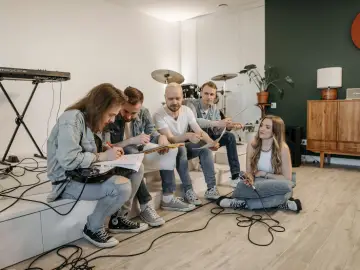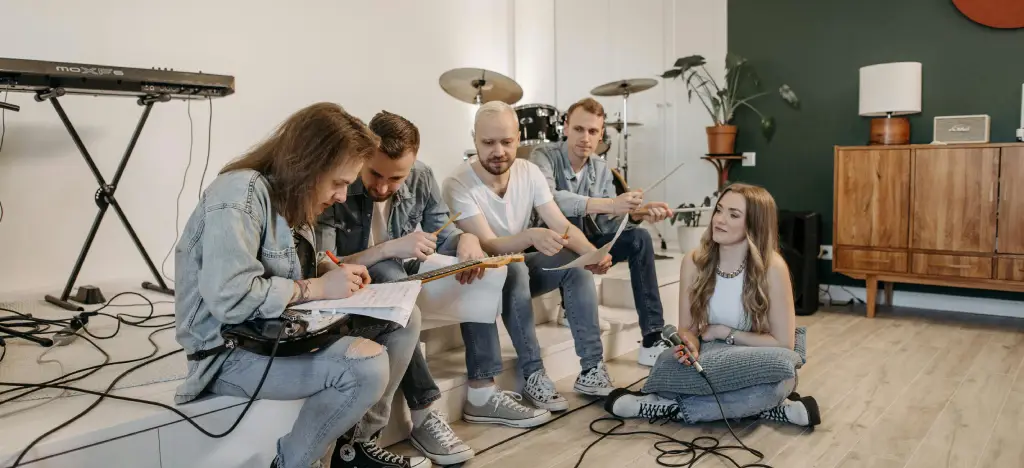I’ve learned music in a lot of ways — strict cello lessons as a kid, teaching myself guitar chords from a book, bass licks from videos, DJing vinyl in my bedroom, playing in bands, and even making coffee in recording studios and just watching. Half the things that made me a better musician weren’t written down anywhere or taught in lessons or tutorials.
These are practical skills and techniques I’ve picked up along the way — things you can do to improve your playing, your feel for music, and your ability to adapt and work with other musicians. You don’t have to be advanced to try them, either. They work whether you’re learning piano, guitar, or singing (or even producing a track).
Here are 10 creative, often overlooked skills that can make a real difference when learning music.
- 1. Play in complete darkness
- 2. Write your own warm-ups to target weak spots
- 3. Learn to recover from mistakes in live performances
- 4. Play around with a song’s mood
- 5. Practice with distractions to improve focus
- 6. Learn to transpose on the fly
- 7. Layer and arrange like a music producer
- 8. Play without an instrument
- 9. Swap instruments to expand your musical brain
- 10. Listen as if your life depends on it
- Explore more about music learning & creativity
- FAQs: Overlooked musician skills
1. Play in complete darkness
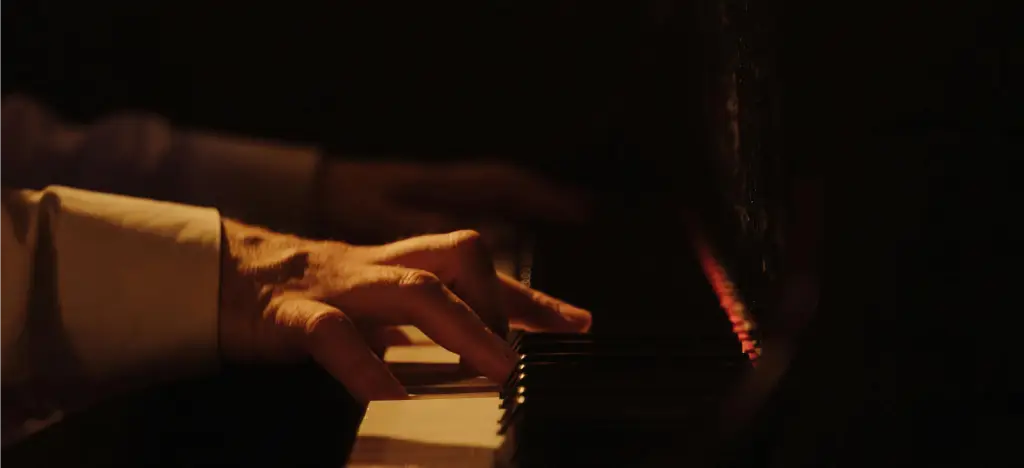 This isn’t just a party trick — it’s one of the fastest ways to sharpen your ear, strengthen memory, and truly feel your instrument.
This isn’t just a party trick — it’s one of the fastest ways to sharpen your ear, strengthen memory, and truly feel your instrument.
I first stumbled across this while playing live. Closing my eyes made me more in tune with the music and blocked out all the distractions: the crowd, the lights, the thoughts about whether my hair looked weird (which it always does). Without it, I’d slip into those “what am I doing?” moments that wreck muscle memory and performance.
Even as a beginner, try it early — it’ll make a huge difference. Pianists, guitarists, and even singers can benefit by practising with the lights down to focus purely on sound, movement and pitch.
Why it matters: It trains you to rely on your ears and touch more than your eyes — making you a more instinctive, confident musician in any situation.
💡 ARTMASTER TIP: If you want more ways to train your ears and instincts, check out Chord progressions explained: a beginner’s guide — it’s packed with tips that work whether you’re on piano, guitar, or just singing along.
2. Write your own warm-ups to target weak spots
 Most of us stick to the same old scales and exercises, but making your own lets you zero in on exactly what you need. Struggling with left-hand jumps on piano? Create a pattern that drills them until they’re second nature. Want cleaner vocal runs? Build a scale in the range that always trips you up.
Most of us stick to the same old scales and exercises, but making your own lets you zero in on exactly what you need. Struggling with left-hand jumps on piano? Create a pattern that drills them until they’re second nature. Want cleaner vocal runs? Build a scale in the range that always trips you up.
The first time I tried this, I realised I’d been spending far too long warming up muscles that didn't really need it — while my real weaknesses stayed exactly where they were.
Why it matters: You’ll improve faster because you’re tackling your problem areas head-on, not running through someone else’s generic routine.
💡 ARTMASTER TIP: Everyone is different. If the “standard” way you’ve been taught doesn’t quite click, take a look at What no one tells you about learning music when you’re neurodivergent — it’s full of adaptive approaches and fresh ideas that really help you find what works for you.
3. Learn to recover from mistakes in live performances
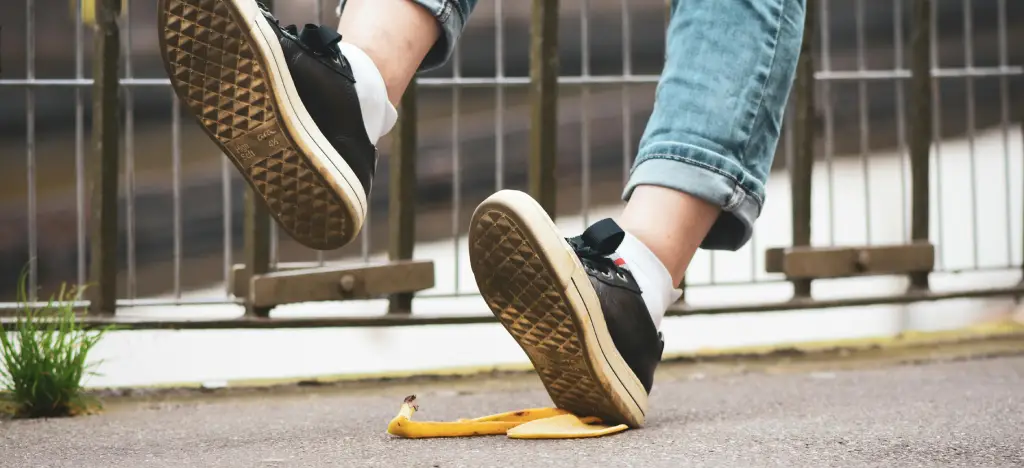 The biggest difference between amateurs and pros? Not whether they make mistakes, but how they handle them. I often hit a wrong note when I’m playing live — it happens more than I’d like to admit. The trick is to go with it: repeat it, twist it into a fill, or just play it again like you meant it. The one thing you never do is stop.
The biggest difference between amateurs and pros? Not whether they make mistakes, but how they handle them. I often hit a wrong note when I’m playing live — it happens more than I’d like to admit. The trick is to go with it: repeat it, twist it into a fill, or just play it again like you meant it. The one thing you never do is stop.
If you keep moving, most people won’t notice anywhere near as much as you do. But if you freeze or pull a face, the whole room knows. Learning to carry on no matter what is one of the most valuable live skills you can develop.
Why it matters: Mistakes are inevitable. Learning “error recovery” turns them into part of the performance and keeps your confidence intact.
💡 ARTMASTER TIP: Everyone slips up sometimes. If you want help staying calm and confident no matter what happens, check out The art of effective music practice. It’s packed with real-world advice on building habits that support smooth performance, even when things go sideways.
4. Play around with a song’s mood
 Playing something in a different way can completely change how you feel about it. On my synth, just switching to a different sound can transform the whole track. Change the key or key type, slow it down into a ballad, or speed it up and thrash it out like a punk song — all without touching the actual melody.
Playing something in a different way can completely change how you feel about it. On my synth, just switching to a different sound can transform the whole track. Change the key or key type, slow it down into a ballad, or speed it up and thrash it out like a punk song — all without touching the actual melody.
I’ve had songs I was bored of suddenly feel new again just by stripping them back to a single instrument, or by pushing them into a completely different style. The notes stay the same, but the mood shifts entirely.
Why it matters: It gives you a fresh perspective, stops you getting stuck in a rut, and teaches you how small changes in delivery can make a huge difference in expression.
💡 ARTMASTER TIP: Want another reason to keep things fresh? Can playing music help you live longer? Science says yes — and switching things up might be part of the secret.
5. Practice with distractions to improve focus
 This ties directly into point 1 — if closing your eyes helps you tune in, adding distractions forces you to stay tuned in no matter what. Life is noisy: shared flats, busy practice rooms, traffic outside, neighbours arguing, even your own family shouting through the door. Practising with background noise — TV on, people talking, or music playing in another room — trains you to focus through it.
This ties directly into point 1 — if closing your eyes helps you tune in, adding distractions forces you to stay tuned in no matter what. Life is noisy: shared flats, busy practice rooms, traffic outside, neighbours arguing, even your own family shouting through the door. Practising with background noise — TV on, people talking, or music playing in another room — trains you to focus through it.
I picked this up from a guitarist who sometimes rehearsed with the football on in the background so that noisy pub gigs felt like nothing.
Why it matters: If you can keep your focus when the world is loud, you’ll play with confidence anywhere.
💡 ARTMASTER TIP: Stronger focus isn’t just for music. See how playing trains your brain in How learning music benefits the brain and body.
6. Learn to transpose on the fly
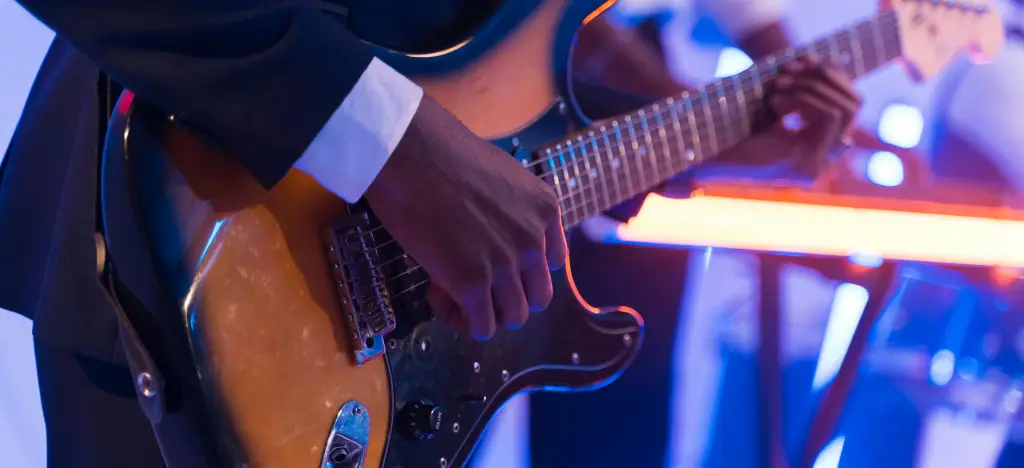 It’s not just band rehearsals — this comes up in choirs, jam sessions, music classes, even when you’re playing for friends. Someone says “Can we do it in G instead?” and suddenly all eyes are on you. Being able to shift keys instantly is one of the most freeing skills you can learn (this is a skill I, myself, am currently working on).
It’s not just band rehearsals — this comes up in choirs, jam sessions, music classes, even when you’re playing for friends. Someone says “Can we do it in G instead?” and suddenly all eyes are on you. Being able to shift keys instantly is one of the most freeing skills you can learn (this is a skill I, myself, am currently working on).
Start simple: take a song you know well and move it up or down a tone. Then try a third, then a fifth. On piano or guitar, link the shapes and patterns you already know to new starting notes. Singers can use this to find a key that sits perfectly in their range; instrumentalists can use it to match others or avoid awkward fingerings. The more you do it, the more it becomes muscle memory — until key changes barely register.
Why it matters: Music isn’t always in the “right” key for you. Being able to adapt instantly means you can play or sing confidently with anyone, anywhere.
💡 ARTMASTER TIP: Changing keys gets easier when you know the theory behind it. Take a look at How to learn music theory for simple ways to connect what you hear to what you play.
7. Layer and arrange like a music producer
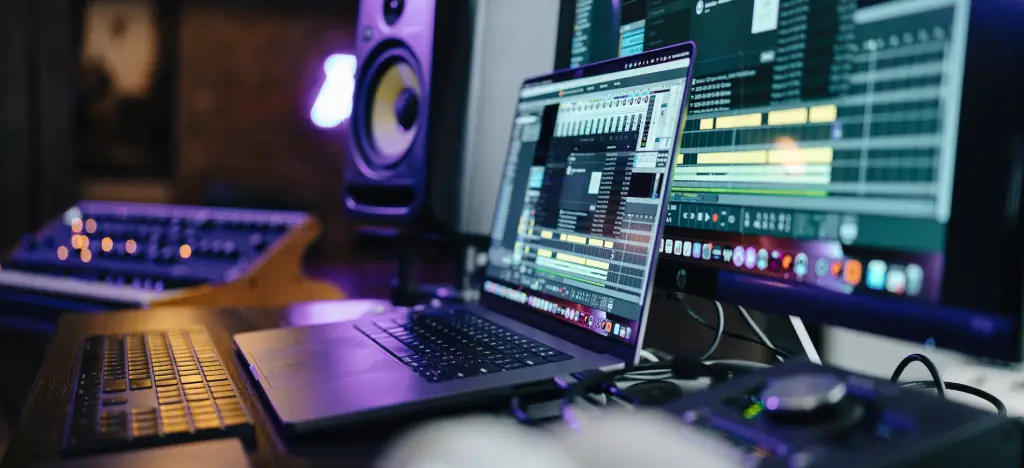 Even if you never touch recording software, thinking like a producer can transform your playing. I first learned this when learning music production — a guitar or keyboard part that sounds brilliant on its own can turn into a muddy mess when everything else comes in.
Even if you never touch recording software, thinking like a producer can transform your playing. I first learned this when learning music production — a guitar or keyboard part that sounds brilliant on its own can turn into a muddy mess when everything else comes in.
Good producers know how to “leave space” so each part has room to shine. You can do the same in rehearsals or live performances by simplifying your part, changing your tone, or playing in a different register. Instead of everyone fighting for the same sonic space, the music feels balanced, textured, and clear.
Why it matters: Great performances aren’t just about playing well — they’re about fitting into the bigger picture.
💡 ARTMASTER TIP: Want to develop that producer’s ear? Try our Music Production for Beginners course with Grammy-winner Sam Pounds for practical ways to shape sound, create space, and make every part count.
8. Play without an instrument
 Sounds odd, but you don’t always need your instrument in your hands to practise. Visualising yourself playing — imagining the feel of the keys, the tension of the strings, or the breath control for each phrase — can improve timing, accuracy, and confidence. Athletes use the same technique to build muscle memory, and it works for musicians too.
Sounds odd, but you don’t always need your instrument in your hands to practise. Visualising yourself playing — imagining the feel of the keys, the tension of the strings, or the breath control for each phrase — can improve timing, accuracy, and confidence. Athletes use the same technique to build muscle memory, and it works for musicians too.
I’ve run through tricky passages in my head on trains, in queues, even while walking — and when I finally sat down to play, my fingers seemed to know where to go. It’s rehearsal without the noise.
Why it matters: It lets you practise anywhere, any time, and often makes the real thing feel easier.
9. Swap instruments to expand your musical brain
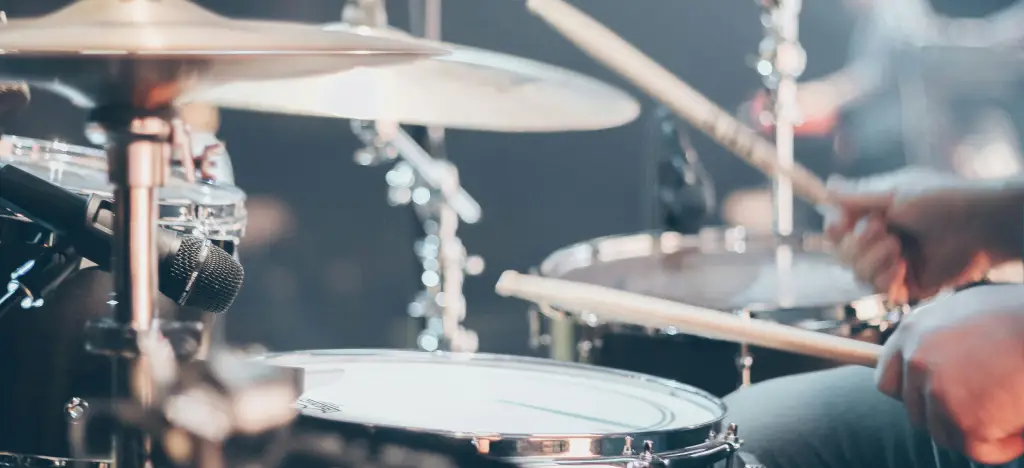 You don’t have to be good at another instrument for it to teach you something. I’m not a drummer, but the times I've spent trying to play a basic groove completely changed how I think about rhythm on piano.
You don’t have to be good at another instrument for it to teach you something. I’m not a drummer, but the times I've spent trying to play a basic groove completely changed how I think about rhythm on piano.
Switching instruments forces you to approach music from a different angle — and that fresh perspective often comes back with you.
Why it matters: A few clumsy hours on something new can sharpen skills you didn’t realise needed work.
💡 ARTMASTER TIP: Fancy trying a new instrument? With our 7-day free trial, you can dive into guitar, bass, singing, orchestral music production, recording and more — and see how much it changes the way you play.
10. Listen as if your life depends on it
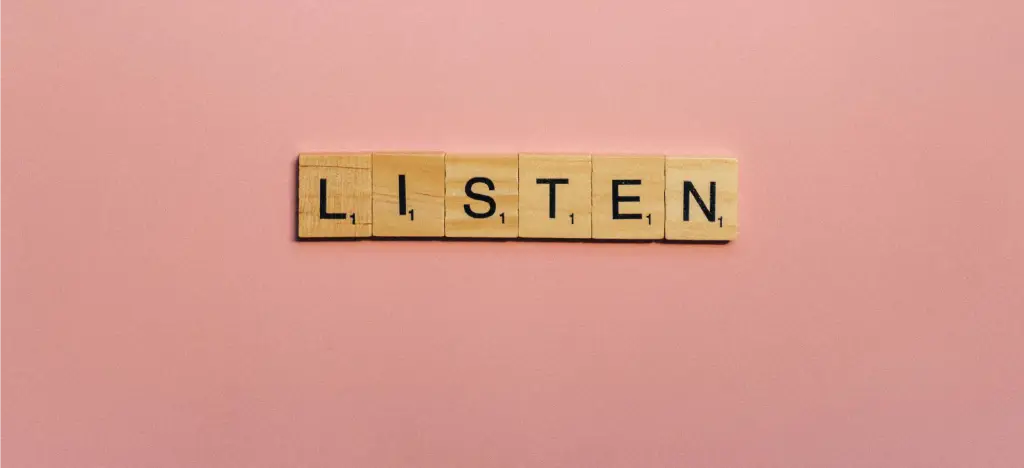 Obvious? Maybe. But there’s listening, and then there’s really listening. Not just to your own part, but to the whole arrangement: the bassline, the hi-hat pattern, the space between notes, the way the instruments lock together.
Obvious? Maybe. But there’s listening, and then there’s really listening. Not just to your own part, but to the whole arrangement: the bassline, the hi-hat pattern, the space between notes, the way the instruments lock together.
I probably first learnt this at school in general music lessons, where listening was treated as a core skill. These days, I still do it with my favourite tracks — picking one element at a time, like the kick drum, the rhythm guitar, or the vocal harmony — and noticing how each part breathes, leaves room for the others, and drives the track forward. It’s how you start to truly understand how music flows.
Plus, when you're playing with others there’s nothing worse than someone completely consumed by their own part. When something goes wrong — and it will — you need to hear it instantly, react, and fix it in a way that keeps the music together.
Why it matters: Music is a conversation, and the best players are always great listeners.
Explore more about music learning & creativity
FAQs: Overlooked musician skills
1. What unusual practice techniques make you a better musician?
Playing in the dark, creating your own warm-ups, and deliberately practising with distractions can massively improve focus, memory, and confidence.
2. How does practising in the dark help musicians?
It trains your ears and muscle memory so you can play fluently even without seeing your instrument — useful for gigs with poor lighting or surprise stage issues.
3. What’s the best way to recover from a mistake in music?
Keep going. Turn it into a passing note, a deliberate variation, or repeat it with confidence. Most listeners won’t notice unless you make it obvious.
4. Can switching instruments improve your main instrument skills?
Yes — trying another instrument boosts timing, rhythm awareness, and creativity, which carry over into your main instrument.
5. How can I change a song’s mood without rewriting it?
Adjust tempo, rhythm, key, or dynamics. Even a happy song can sound melancholy — or vice versa — without changing the actual notes.
6. What is ‘mental practice’ for musicians?
It’s visualising your playing — imagining the feel of the keys, strings, or breath control — which builds muscle memory even away from your instrument.
7. Why is deep listening essential for musicians?
It helps you hear how your part interacts with others, adapt instantly, and play more musically as part of a group rather than in isolation.
About the author
Matt Ford is a musician, teacher, writer, and lifelong student of sound.
With years of experience in both performing and teaching, he shares practical advice through ArtMaster to help musicians at every level build skill and confidence in their playing.
